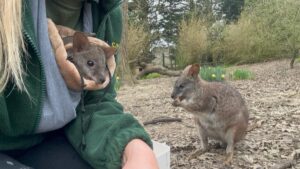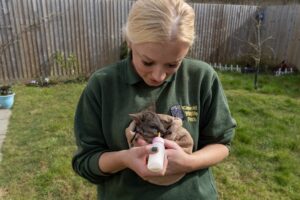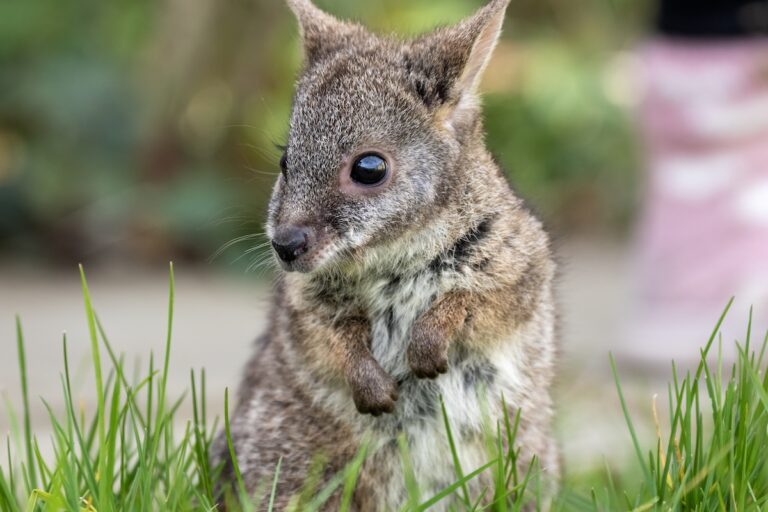Meet Elvis, the Parma Wallaby Joey, who was recently born at Cotswold Wildlife Park. Elvis was orphaned soon after birth, as Deputy Head of Mammals, Jenni Maxwell (pictured above), explains: “Sadly, his mother died whilst he was still in the pouch, so the decision was made to rear him by hand. Without intervention, he wouldn’t have survived”.
Jenni took on the responsibility and became a surrogate mother to the vulnerable newborn. Not only is this the first time Jenni has raised a joey, it’s also the first time in the Park’s history that a Parma Wallaby has been hand-reared.
Staff at the Park immediately made preparations for the orphan, which included making a new home to mimic his mother’s pouch. Chris Kibbey, Assistant Animal Manager, Registrar and keen amateur sewist, said: “I received a call on my day off from Jenni with an urgent request for an artificial Wallaby pouch. After discussing a few size requirements, I raided my haberdashery for some baby-soft fabric and got out my sewing machine. I made the pouch double-layered, with a soft faux fur layer on the inside to provide comfort and warmth to the joey. A drawstring was added to the top so the pouch could be closed while the joey was sleeping. A small loop with a clip was added on the back to enable the pouch to be suspended, as real Wallaby pouches don’t usually rest on the floor! Washable baby-safe materials were used, which meant Jenni could clean the pouch if the joey soiled it. I was delighted to receive a video of the joey snuggling up in the new pouch shortly after handing it over.”
Jenni took Joey home, where he could be given around-the-clock care and, ultimately, the best chance of survival. She said, “At the beginning, I was feeding him every two hours throughout the day and night. The feeds would take about 40 minutes, so it was a long process, and I learnt how little sleep you can function on!”
The joey has been given free reign of Jenni’s house. In the evenings he enjoys a fuss from Jenni and nestles up to her on the sofa. He particularly likes being brushed under his chin with the tiny comb Jenni has for her hamster and cuddling up to his kangaroo teddy.
Elvis has left the building
Now he’s grown in confidence and size; he’s started to graze in Jenni’s garden. He’s also taken daily to the Park’s Wallaby paddock, not only to exercise and strengthen his legs, but also to get him used to being outdoors and among his own species. Jenni commented: “He bombs around and is really fast! These socialising sessions are important as he’s learning how to be a Wallaby by mixing with our group every day. It is hoped that Elvis will eventually rejoin the Wallaby group at the Park and one day be part of the European Breeding Programme (EEP)”.
Commenting on her role as a surrogate mother, Jenni added: “Although mentally and physically exhausting, it  was one of the most rewarding things I’ve done in my career. As time has gone on, his personality has really come through, and he’s got quite the attitude for such a little man! The whole process has been a learning experience – from how much exercise he needs a day to what his favourite foods are (which is sweet potato at the moment but it changes daily). There have been many highlights but my favourite was when he learnt to hop out his pouch for the first time. That was really exciting! Another milestone moment was when he started to nibble at solid food as his teeth started to grow”.
was one of the most rewarding things I’ve done in my career. As time has gone on, his personality has really come through, and he’s got quite the attitude for such a little man! The whole process has been a learning experience – from how much exercise he needs a day to what his favourite foods are (which is sweet potato at the moment but it changes daily). There have been many highlights but my favourite was when he learnt to hop out his pouch for the first time. That was really exciting! Another milestone moment was when he started to nibble at solid food as his teeth started to grow”.
The joey is named after Jenni’s father’s favourite singer, Elvis Presley. In fact, Elvis was gifted two Wallabies during his life—once while he was filming ‘Jailhouse Rock’ in 1957 and the second time in 1962. He donated each of the animals to Memphis Zoo.
Visitors can see the Park’s group of Parma Wallabies in their large outdoor exhibit near the Capybara enclosure. Jenni designed the new Wallaby House, which was completed in 2023. Elvis will remain off-show while he is being hand-reared.

